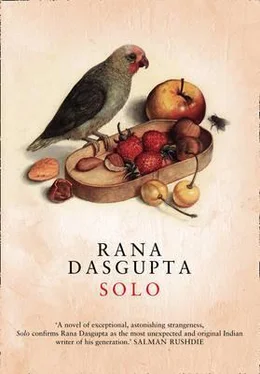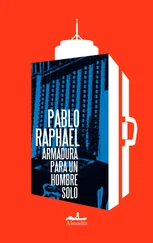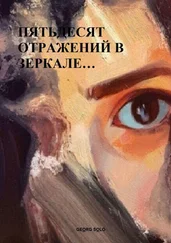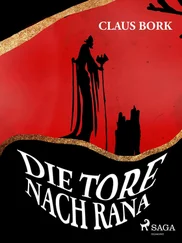In their room a single candle was burning.
Her mother had passed out with vodka, and snored in her stupor. Her brother’s bed shook with agitation. She brought the candle close, and he was shiny with sweaty sleep; his lips looked blue. She shook him desperately awake and wrapped a blanket round him, she broke ice from the bucket and warmed it on the stove. He drank fitfully, and she wiped his face and neck. She gave him some bread. She wept.
‘Please get well. I’m sorry for leaving you. Please get well.’
He smiled at her wanly, and lay back under the blanket. She stroked his wet hair, and sobbed. Her mother was roused by the commotion.
‘What’s going on?’ she murmured.
‘What’s going on? What’s going on?’
Khatuna leapt up, beside herself.
‘Your son is delirious from fever! And look at you, knocked out with drink. He could die and you wouldn’t even know it!’
Khatuna took a swig from the vodka bottle and emptied the rest in the fireplace.
‘You’re a worthless woman,’ she said. ‘You should die.’
Her mother began to cry.
‘What can I do? There’s no money. I’ve sold everything. I’m miserable, Khatuna: be nice to me.’
Khatuna seized her box from the corner and unlocked it with the key she still kept around her neck. She took out the ivory crucifix and threw it at her mother.
‘Why don’t you sell this?’
Her mother fingered it, blankly.
‘I thought I had lost it.’
‘No. I took it from you. That’s why it isn’t sold yet.’
Her mother began moaning into the pillows.
‘Stop it!’ cried Khatuna. ‘This self-pity. Find yourself a man like everyone else. Someone to pay for your vodka and your son’s medicine.’
She looked at her deliberately.
‘Don’t worry yourself about us any more. I’ll take responsibility for Irakli and me. You just look after yourself. See if you can.’
After that, Khatuna burned all her diaries. She had written regularly, and had filled a large stack of notebooks. She put them listlessly on the fire, one by one, her mind becoming strangely void.
She got a promotional job with a foreign tobacco company. They gave her an outfit in the colours of a cigarette brand, and she stood by Philharmonia in the evenings offering free cigarettes to passers-by. She was attractive and flirtatious, and people liked to take her cigarettes: she promised ‘Best Brand in the World!’ as she exhaled gaily.
Men stopped to talk, and she moved them on. ‘Take another for your girlfriend!’ she shouted after them.
The job did not interfere with school, and gave her a little amount of money to stave off disasters. The company was satisfied with her performance.
Her mother sold her long, black hair to a wig maker. Khatuna thought it was a bid for sympathy, and offered no reaction when she saw her mother’s shaved head. Instead she asked,
‘Did you sell that crucifix?’
‘Yes.’
‘How much did you get?’
‘Three bottles of vodka.’
Khatuna spat in her mother’s face.
One spring evening, Khatuna was standing with her tray of cigarettes outside a bar on Perovskaya Street. The bar was named Beluga. Young playboys were out with Gucci sunglasses for the darkness, and models for each arm. There were man-hugs and back-slaps, and car keys rapped on glass when bouncers took too long to unlock doors. Eye make-up sparkled in the nightlights, and men dealt kisses on practised cheeks. A taxi clattered around the potholes, and three girls climbed out, singing together,
You’re just too good to be true .
Can’t take my eyes off of you .
You feel like heaven to touch .
I wanna hold you so much …
A black Mercedes drew up, spilling bodyguards. A man got out with velvety movements, lithe in a suit and T-shirt, and Khatuna was surprised to see that it was Kakha Sabadze, the footballer-turned-tycoon. He was unmistakable, for his face was disfigured by a wine-red birthmark in the shape of Australia.
‘What’s he doing in a place like this?’ she wondered.
Kakha Sabadze was one of Georgia’s richest men. Before Khatuna was born he had already been a famous footballer who had played for Dinamo Tbilisi, and for the USSR in the World Cup. They used to call him legendary , when the word still had a depth of meaning. When communism fell, Sabadze became Minister for Sports, and made himself rich selling Georgian football players to foreign clubs. He left behind politics for business. Now he owned an oil company, several mines and a chain of hotels, and he had a monopoly on the supply of Mercedes cars into Georgia. He was chairman of the national airline. His nephew ran a television company and his daughter was the country’s leading model.
Kakha Sabadze walked past Khatuna with his men all around and she held out a cigarette.
‘Would you like to improve your life, Mr Sabadze?’
He stopped.
‘My life is already perfect. What can you offer?’
‘Marlboro. Best cigarette in the world.’
‘I don’t smoke. I take care of my health.’
Khatuna looked at him patiently.
‘I know how rich you are. But at your age, youth must be more exciting than money. Every time you talk to a woman as young as me, you must think of what you can never buy.’
‘I’m not so old!’ He laughed for his men. ‘And I know a lot of women as young as you.’
‘Passing through your life, in and out of your bed. Do you remember it after it’s over, Mr Sabadze?’
‘What does that mean?’
‘Look into my eyes. The moon is full tonight, and you have met a beautiful Georgian woman. Wouldn’t you like to remember how it feels? Smoke one of these world-famous cigarettes and you can inhale this moment so it will never go away. It will stay with you and keep you young.’
Kakha Sabadze laughed.
‘Do they tell you to say these things?’
He took a business card from his pocket.
‘I don’t want your world-famous cigarette. But here is my card. You can call me and we’ll talk.’
‘I’m very disappointed.’
‘What’s your name?’
‘Khatuna.’
‘Khatuna. Call me.’
And he disappeared into Beluga with his bodyguards, while Khatuna stood on the sidewalk staring at his business card in her hand. A little paper miracle.
5
KAKHA’S HOUSE WAS LARGE AND NEW, and set back from the street. When Khatuna arrived there, she found him in the kitchen, talking on the phone.
His movements were easy, and his birthmark less ruddy up close. She appreciated the smooth economy of his kitchen, the steely surfaces opening on to dishwashers and ovens.
She wandered out into the hallway. A bodyguard was sitting there, reading a paperback. There was a giant framed photograph of Kakha Sabadze from the football days, standing with a trophy, a mass of tousled hair and a blue-eyed gleam of boyish achievement. Pairs of shoes were lined up neatly; in the corner stood a small tree planted in a yellow oil drum. A staircase wound up out of sight.
She heard the end of Kakha’s conversation.
‘Step outside your house in three minutes. A black Audi will come to pick you up.’
She went back into the kitchen and found him sitting at the table with two glasses of beer. She sat down with him.
‘You’re still selling cigarettes?’ he said.
‘World-famous. Yes.’
‘Are you going to do that all your life?’
‘I’m going to travel all over the world. I’ll have a big house, and another for my brother, too, so he doesn’t get into trouble. I’ll drive a Mercedes and wear big diamonds on my finger.’
‘How are you going to make all that money?’
‘Business. I’ll make loads of money in business. When I’m really rich I’ll study architecture and rebuild Tbilisi.’
Читать дальше
Конец ознакомительного отрывка
Купить книгу












